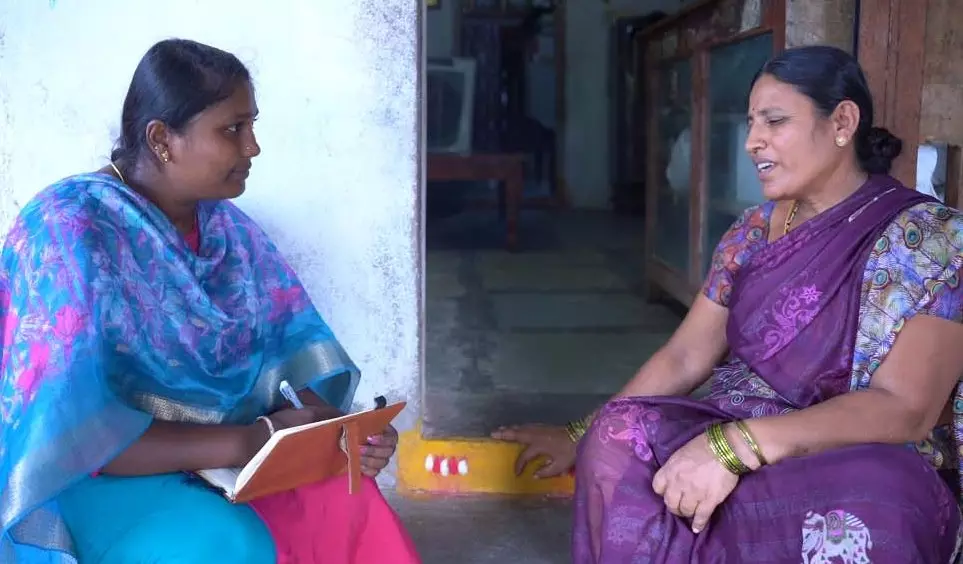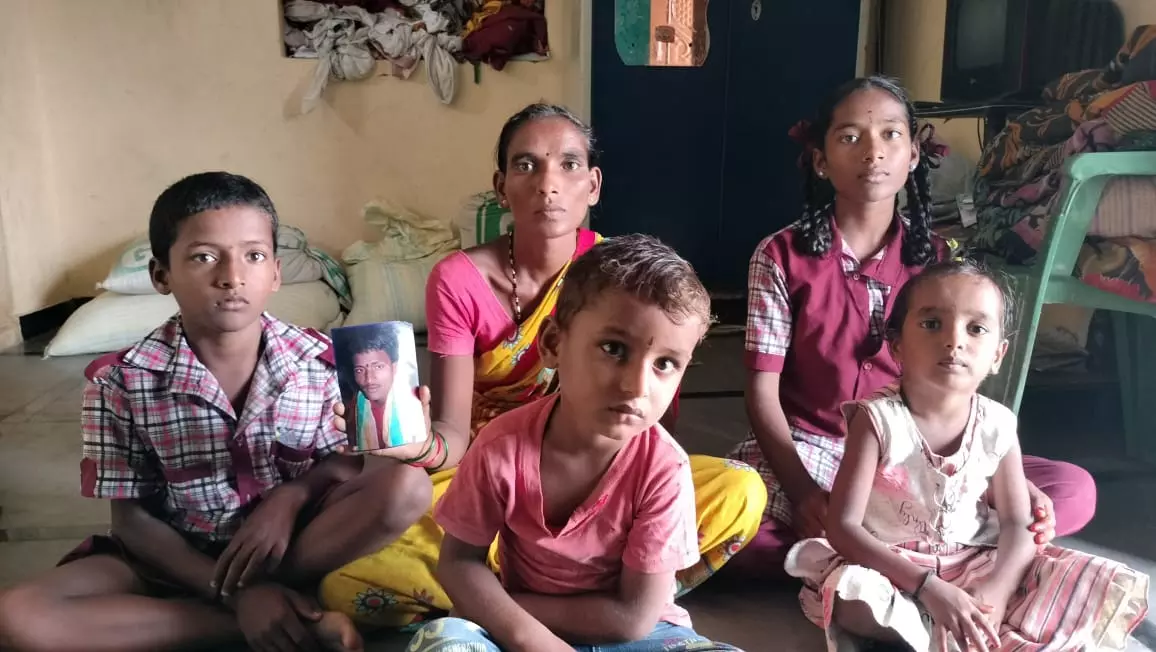
- Home
- India
- World
- Premium
- THE FEDERAL SPECIAL
- Analysis
- States
- Perspective
- Videos
- Sports
- Education
- Entertainment
- Elections
- Features
- Health
- Business
- Series
- In memoriam: Sheikh Mujibur Rahman
- Bishnoi's Men
- NEET TANGLE
- Economy Series
- Earth Day
- Kashmir’s Frozen Turbulence
- India@75
- The legend of Ramjanmabhoomi
- Liberalisation@30
- How to tame a dragon
- Celebrating biodiversity
- Farm Matters
- 50 days of solitude
- Bringing Migrants Home
- Budget 2020
- Jharkhand Votes
- The Federal Investigates
- The Federal Impact
- Vanishing Sand
- Gandhi @ 150
- Andhra Today
- Field report
- Operation Gulmarg
- Pandemic @1 Mn in India
- The Federal Year-End
- The Zero Year
- Science
- Brand studio
- Newsletter
- Elections 2024
- Events
Farmers’ suicides in Telangana: How widows are finding ways to rebuild their lives
Debt, drought, and poor schemes drive farmers in Telangana to their deaths, leaving behind wives who must fight many a battle. From milch cows to small shops, NGOs are filling the gaps the state refuses to see

Gugulothu Raju was a small farmer in Telangana. He cultivated cotton on his two acres, entirely dependent on rainfall. When the rains failed, even the money he invested could not be recovered. He tried sinking borewells, but there was no water. To escape losses, he leased another two acres. But crop investments only grew higher, and debts began piling up. He borrowed from relatives...
Gugulothu Raju was a small farmer in Telangana. He cultivated cotton on his two acres, entirely dependent on rainfall. When the rains failed, even the money he invested could not be recovered. He tried sinking borewells, but there was no water. To escape losses, he leased another two acres. But crop investments only grew higher, and debts began piling up. He borrowed from relatives and acquaintances, but the crops still failed. Losses mounted. The moneylenders hounded him. Unable to bear the humiliation, he committed suicide.
“Five years ago, my husband left us, consumed by debt. Along with the grief of losing him, the burden of raising two children and repaying his debts fell entirely on me. Many times I thought of ending my life. But when my children’s faces came to mind, I stopped. Each day I had to go for daily wage work just to get food for us. That’s how I somehow raised my children,” said Raju’s wife, Swaroopa, when we met her in Panjagutta Thanda, Akkannapet mandal, Siddipet district.
She is not alone. There are over 40 such families in Jangaon district alone, widows of farmers who killed themselves, all struggling without livelihoods. “In Telangana, families of farmers who commit suicide are given Rs 6 lakh compensation. But most of it goes toward paying off debts. And there are so many conditions attached that most families don’t even get the support,” explained Umesh, a representative of Subhiksha Agri Foundation, an NGO dedicated to helping farmer suicide-affected families.
On behalf of Subhiksha, Swaroopa was given a milch cow. It now provides her with some income, and the foundation also helps support her children’s education. What happens to a farmer’s family when he takes his own life? To provide them social security, full livelihood support, and a path out of poverty, Subhiksha Agri Foundation was established in 2016.
“When a poor farmer is driven to suicide, there are always powerful reasons behind it. We are committed to ensuring government welfare schemes actually reach farmers’ families, supporting children’s education, protecting their health, and providing constant follow-up. Our organisation stands by families affected by farmer suicides and the poorest households. We provide financial assistance to help them take up livelihoods they already know,” says Narendar Garidi, Director of Subhiksha Agri Foundation.
Also read: Araku coffee: How Andhra Pradesh govt, tribal farmers are taking organic beans global
“Every month we hold meetings to listen to their struggles, offer moral support, and rebuild their mental strength. For three years, we support each family until they stabilize,” adds Garidi. His friend, Rambabu Virgineni, is the founder of the foundation. Both come from farming families themselves. Having grown up watching the struggles of cultivation, they later worked in software companies abroad. About 10 years ago, Narendar returned to Hyderabad to work on development projects.
For farmers’ families, they provide support for dairying, flour mills, grocery stores, as well as school fees and career counseling for children. Women are trained in skills to become entrepreneurs. In Jangaon, three women have started efforts to run a millet centre.
In the last five years (2020-2025), an estimated 2,000-2,500 farmer suicides have taken place in Telangana. The main reasons are debt burden, crop failures, irrigation problems, and especially falling groundwater levels. Many farmers borrow heavily to drill borewells, which often fail. Improper implementation of welfare schemes and incomplete loan waiver programmes also drive them to despair.
“When the hands that feed the nation are forced to end their lives, how horrific must their conditions be! Yet the government machinery that designs policies pays no attention to these root causes. When farmers, unable to bear debts, die by suicide, it is their wives and mothers who shoulder everything: repaying debts, raising children, marrying off daughters, and carrying on life,” says independent researcher and writer Kota Neelima, author of Widows of Vidarbha: Making of Shadows (2018), a book documenting the lives of 18 such farmer widows, each courageously holding on to self-respect while leading inspiring lives.
Mangamma, who now runs a grocery shop in Jangaon, shares a story like so many others. Eight years ago, her husband Harilal, drowning in debts, killed himself, leaving her with two children and creditors closing in. She too attempted suicide several times. Once she even brought home a bottle of pesticide hidden inside a cool drink bottle. Relatives noticed, consoled her, and saved her life. Even then, with no support at home, she struggled to raise her family. That’s when Subhiksha volunteer Sagarika gave her hope for the future.
The organisation gave her financial support to start a grocery shop and also provided a flour mill. With the income from these, she later started her own chicken shop. She slaughters and sells the poultry herself. From this income, she managed to marry off her daughter. Her son now works in a private job in Hyderabad. Life has stabilised. Soon, she plans to open a millet store and become a full-fledged entrepreneur, with Subhiksha’s help.

Mangamma (right), who runs a grocery shop in Jangaon, lost her husband, Harilal, eight years ago.
“All of this is possible only because Subhiksha gave me confidence,” she says. When we met women like Nirmala in Jangaon, we felt their courage and resilience were greater than that of many educated urban women with jobs. “These women are ordinary, with little education, no exposure to the outside world, and no financial backing. Yet they continue their lives with dignity. If they too had taken their lives like their husbands, what would have become of their children?” says volunteer Sagarika, who travels daily across Jangaon and Siddipet to meet such families and provide support for children’s education.
During the 15 months of the Revanth Reddy-led Congress government, which came to power in December 2023, a staggering 442 farmer suicides were reported, with 376 occurring in 2024 alone. This is a sharp reversal from the 178 cases recorded in 2022, believed to be fuelled by financial strain and perceived failure of key government promises like loan waivers and the Rythu Bharosa support programme, which “focuses on offering financial aid and access to agricultural resources to empower farmers and improve productivity.”
Adilabad district has emerged as a particularly hard-hit region. Between December 2024 and August 2025, 10 farmer suicides have occurred in the district, including a 47-year-old who ended his life due to crop failure and mounting debts. Another farmer, later identified as Vuyika Madhav, died in February after attempting suicide over loan repayment issues; this marked the ninth such incident in just two months. Earlier in January, three more suicides were reported in quick succession, underscoring the sustained distress impacting tenant farmers and smallholders in the region.
Also read: Mysuru Dasara may see Abhimanyu’s last walk as Golden Howdah bearer this year
Tenant farmers are disproportionately affected by the crisis. Ahead of the 2025 kharif season, tenant cultivators — supported by the Rythu Swarajya Vedika (RSV), which works for ensuring sustainable livelihoods for agricultural communities in Andhra Pradesh and Telangana. — demanded reinstatement of the Land Licensed Cultivators Act, 2011, calling for identity recognition, access to loans, insurance, and procurement benefits. Alarmingly, according to RSV, over 75% of farmer suicides in Telangana involve tenant farmers, who remain excluded from formal support due to their unrecognised status.

A farmer’s family in Narayanpet district
Adding to the tragedy, medical professionals in Telangana are raising urgent alarms about paraquat, a highly lethal herbicide increasingly used in suicide attempts. Doctors at Gandhi and Osmania Hospitals report almost daily cases of paraquat consumption, often by farmers — all with a grim survival rate of only 5-10%. Despite being banned in over 70 countries, including the EU and China, paraquat remains easily available in parts of India, prompting calls in the state assembly for a complete ban and stricter regulation.
A key lifeline for distressed farmers in Telangana has been the Kisan Mitra helpline, established in 2017. It offers emotional support through trained counsellors and connects farmers directly with government services and relief schemes. Since inception, the helpline has managed to resolve nearly 11,000 distressed calls, with another 3,400 in process, especially from districts like Adilabad and Vikarabad. Success stories are numerous — for instance, a sugarcane farmer on the verge of suicide was provided legal documentation support and a loan through the helpline, preventing a potential tragedy.
Despite all this, however, farmer suicides in Telangana remain a matter of grave concern. Seen from the government’s perspective, they appear to be one-way. But when you meet people on the ground, the true picture comes out. A farmer may die because of one or two problems. But the wife who survives must face hundreds. Often the land is not even in her name. To get it transferred, Nirmala had to run around offices for two years.
“Banks don’t give us loans. We struggle for seeds and fertilizers. We don’t have our husbands’ farming experience. Yet we live on with hope for our children’s future,” says Nirmala, while feeding fodder to her cattle and milking them. Thanks to the Subhiksha Foundation’s efforts in the past five years, more than 250 farmer families have benefited. About 600 members have gained indirect support, and 90 families have found stable livelihoods.
